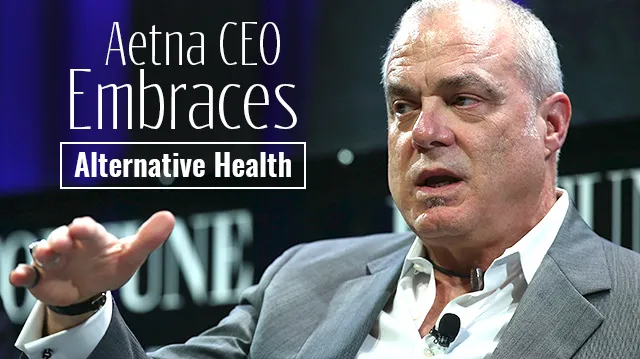What do the ancient practices of meditation and yoga have to do with leading a multimillion-dollar insurance company? Apparently, they can provide a lot of help along the way.
Recently, The Huffington Post featured Mark Bertolini, CEO of Aetna, on a video series titled “Pioneers,” which “profiles leaders in various industries who have redefined success by making it their mission to live more meaningful and less stressful lives.”
Bertolini told reporters that he began practicing both yoga and meditation after a serious skiing accident in 2004. During the accident he hit a tree, and subsequently battled chronic pain and the prospect of enduring disability. Bertolini claims that meditation gave him a way to deal with his pain. He explained:
“I still have my pain, but as we say in the meditative arena, in the mindfulness arena: ‘I have pain, I’m aware of my pain, I am not my pain.’ I had to learn how to be more ‘Zen’ in the way I approached my daily life, and meditation was a way to learn how to do that.”
Not only has meditation been linked by research to helping to prevent and alleviate pain, it has also been associated with a myriad of other significant health benefits — both physical and mental. These include rebuilding the brain, overcoming addiction, aiding in fat loss, and ameliorating anxiety and depression. Sounds like Bertolini is definitely onto something.
Bertolini also puts a spotlight on yoga in helping him through day-to-day life. When asked by an interviewer for Knowledge@Wharton, the online business analysis journal of the Wharton School of the University of Pennsylvania, about what he does to “keep the innovation spirit going,” Bertolini answered:
“I have a yoga practice. I get up in the morning and I do Viniyoga. My partner trained with [Tirumalai] Krishnamacharya in Madras back in the day. She helped introduce me to the eight limbs of yoga, which is not about exercise. It’s about motion initiated by breath to still the mind and the body, to be able to sit in meditation for a long period of time, to reach ultimately samadhi [or a heightened state of awareness].”
Both of these ancient practices, along with his personal experiences, have helped Bertolini shape his views on health care. In 2001, his son was diagnosed with cancer, and though he made a full recovery, he had to have a kidney transplant. Bertolini donated one of his own kidneys to his son, and was with him during his road to recovery.
Through this process, Bertolini became aware of the importance of health care not just for treating an immediate condition, but in a patient’s road to recovery. He told “Pioneers”:
“What I found very quickly in both his circumstance and mine was getting our lives back, becoming engaged and productive members of society, was something that the health care system cared very little about.”
One major area of his business that Bertolini has focused on is the well-being of his employees. Last year, he raised the minimum wage for all Aetna workers in the United States to 16 dollars per hour. This, he stated, alleviates much of the financial stress in his employees’ lives. Bertolini elaborates:
“If people are too busy looking for food, if they’re too busy stressing about whether or not they have enough money to pay for their health care, how can they possibly sleep?”
Furthermore, regarding stress, and his journey as a CEO and a person, Bertolini told Knowedge@Wharton:
“The journey is an inner one and if I understand that inner journey well and I treat others well, I’m treating myself well — and in that it makes me stress free. It makes me be much more considerate of others and their needs. And there is no good or bad. The idea is to find out what that person is trying to teach me that I don’t understand. In that whole way, you come to your work very differently as a leader and as a person. The joy of my journey has been trying to help other people see that and engage in it and learn from it.”
There is a lot of wisdom in this approach, and in the notion that treating others well can reduce stress for all parties involved. It’s great to see someone at the top of the health insurance industry focused not solely on money, but on compassion.
-Tanya Rakhmilevich
Tanya is a writer at The Alternative Daily with a passion for meditation, music, poetry, and overall creative and active living. She has a special interest in exploring traditional Eastern remedies and superfoods from around the globe, and enjoys spending time immersed in nature.
Sources:
http://www.huffingtonpost.com/entry/mark-bertolini-pioneers_us_56f2aa80e4b0c3ef5217534a
http://knowledge.wharton.upenn.edu/article/aetna-ceo-on-leadership-yoga-and-fair-wages

